Say 'Uncle'
'Uncle Bruce,' that is!
Pastor Bruce Rodrick on a lifetime of Ministry, Television, and Puppetry
(Photos courtesy Bruce Rodrick)
Pastor Bruce Rodrick hosted two programs on WFLA, Channel 8: "Kid's Bible Club," and "The Uncle Bruce Show." What shown through all Rodrick's work is a concern and care for the young viewers. There was plenty of laughs and adventure on "Uncle Bruce," but a little chicken soup for the soul as well.
Bruce Rodrick was born in Des Moines, Iowa. His father was a career man in the U.S. Army, and served bravely during World War 1. Rodrick's mother kept the family firmly grounded with regular visits to church and home Bible readings. Bruce developed in interest in performing and puppetry very early in life.
"I became interested in ventriloquism and puppetry when I was a little boy. It all began with listening to Charlie McCarthy and Edgar Bergen on the radio. They had cutouts of Bergen's characters on the back of cereal boxes so that you could make your own ventriloquist figure, and things like that got me all wound up.
I remember the first puppet I ever found was in a novelty store in downtown Des Moines. I was a teenager by then, and it was the first puppet I bought. Then I got some books on the subject including a great one by Bessie Fickland on puppetry. Then, I began to make my own.
During World War II, my father was called back from his retirement into the Army. He served as commanding officer of an Iowa State Guard unit. They had motorcycles and that was where I learned to ride at age 15.
I was a junior in high school, around 1946, and they offered credit towards graduation for military service. All those John Wayne movies had their effect on me and my friends. A large number of us enlisted together and joined the Marines. I trained in California at Camp Pendleton. I was already an accomplished motorcycle rider when I joined the Marines, and that's why they put me in the motorcycle M.P. (Military Police) unit. My dad was extremely proud of my time in the Marines. He was present in uniform and assisted with the graduation ceremony from boot camp in San Diego. They took a picture of us and featured it in the Marine Corps magazine.
After the Marines, I returned home and a preacher in the Christian Church, who was very good with young people, encouraged many of us to attend a Christian college. I went to a Christian college in Minneapolis, and the decision to preach came at the end of my first year, although I'm sure my mother's influence had something to do with it. My father, who was proud of my Marine service and my choice to be a minister, died about three months after I began preaching and got to hear me just once. I had my first ministry in a little country church in Canby, Minnesota, and was there for five years."
It was during this time that Rodrick realized that the use of puppets and ventriloquism was an effective way of reaching young people. His research into the subject lead him to read a book by the top ventriloquist of the time.
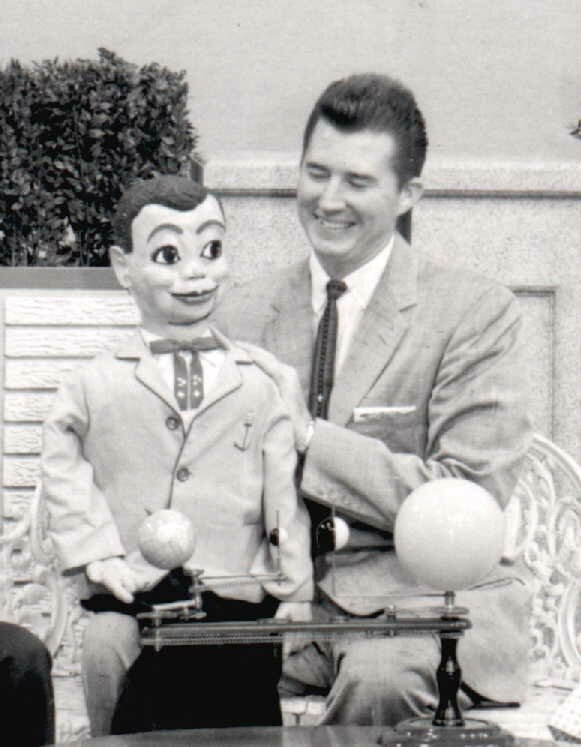
'Little Mike' took one year to make
"I read Paul Winchell's book "Ventriloquism for Fun and Profit," and used the information to make my own figure. It took me about a year to put 'Little Mike' together. I modeled him from clay, made a mold, and lined the mold with plastic wood. Today, he's still pretty much the same guy, except with a nicer hairdo. Mike is heavier than he should bethat's always been a problem. But he got so well known in so many places I couldn't bear to go with another figure."
Bruce married and began serving the ministry with a life on the road.
"They used to have these big revival meetings that were very popular, especially in the south. Sometimes they would go on for two or three weeks. We traveled all over the United States doing that, and I used the ventriloquism and the puppets as part of my program. I was a guest on a whole bunch of children's TV programs across the country to talk about the revivals. Usually they were glad to have us, because of the ventriloquism. We held meetings in Tampa around 1959, and I was a guest on The Mary Ellen Show. We got on to promote the meeting, and I had "Little Mike" with me."
Bruce and his wife knew that the time had come to make a change in their busy lifestyle. The pause also gave him time to solidify the concepts for a new television show.
"Marj and I had a son, David, who was getting to be of school age. We decided to stop traveling and had an opportunity to move to Tampa and serve a church.
There were plenty of Christian programs on TV at the time, but not many for children. I had this idea for a long time about a Sunday morning children's Christian program. Because I'd had many contacts with the television industry, I had all these thoughts forming for a show from a Christian point of view. I took it Channel 8 and they picked up on it right away, and in just a few weeks we were on the air with "Kid's Bible Club."
Story Time on "Kid's Bible Club"
"Kid's Bible Club" was recorded at WFLA's studio every Tuesday night, so that Pastor Rodrick would not have to appear and work on Sunday mornings (except at his own church!)
"We always invited children to come in. There would be two groups of 3 or 4 kids each, representing their local churches. We had them set up as teams, and as part of the half hour we would have a Bible quiz, and reward the winners with a trophy. We always did a Bible story, and had some young singers as well. "Little Mike" and I were hosts and would sometimes have a little sketch. We also used some puppets on stage and did our own Bible dramas. We did versions of "David and Goliath," or "Daniel and The Lion's Den". I made these small hand puppets in the same way I made "Little Mike," and they got to be pretty elaborate."
"Kid's Bible Club" actually drew a good-sized audience, and management at Channel 8 realized that with Rodrick, they had a good host warming up in the Sunday morning bullpen.
"Jay Faraghan was the program director of Channel 8, and he approached me and asked me about doing a daily program. They needed something because of Mary Ellen and all the other shows."
Rodrick had to do some soul-searching before taking on the challenge of a daily program.
"I got so excited over this chance to be on TV every day, and I talked it over with the church. They were very encouraging because they said I had this opportunity, and I ought to go for it. It was a difficult decision, and I don't know if it was the right one. I felt like in the long run that it shortchanged the churchbless their heartsthey were great people. I chose at that time to go with TV in the hope of using it as a special ministry to youth. We started in June of 1961 on the Bible Club, and went on the air with "Kid's Carousel" in September. They changed the title to "The Uncle Bruce Show" later."
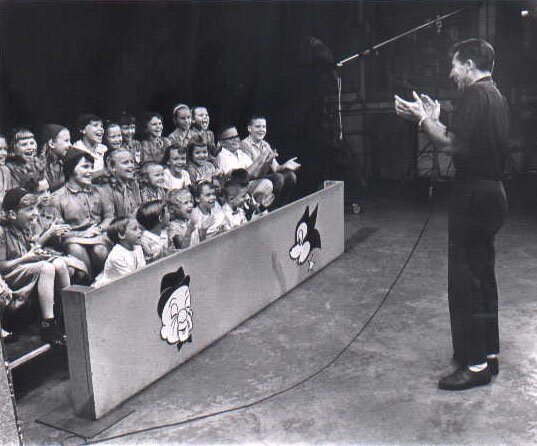
Warming up the Uncle Bruce peanut gallery
Entertainment was always the most important part of "Uncle Bruce," but Rodrick was determined to give his young viewers some sugar-coated lessons along the way.
"Values were always very important to me, and I did want to try an encourage kids in that direction. I couldn't do a whole lot from the Christian point of view during the week, but I had that Sunday program for that. On the weekdays, we'd try to have elements that taught Christian principles without getting too involved. In a sense, you could do more without offending, and I didn't get any static about what we were doing, but I tried not to be too obvious about that during the week."
Rodrick's home-built cast of puppets were there as the vehicles for tales of friendship, trust, and values.
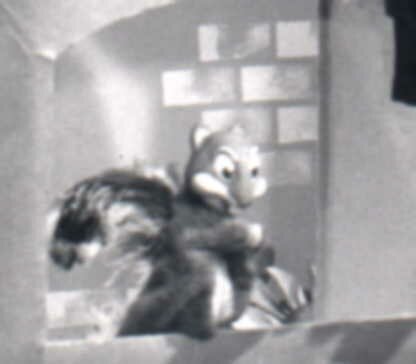
"Bushy" the Squirrel
"There was a big, beautiful tree and 'Bushy' the squirrel lived in it. He was a great character that I made in one day, and he became one of my favorites. Above the cuckoo clock, there was a crow named "Zookey," and he would always come on and announce the beginning of the show. I had a dragon named "Albert" who could actually spit fire. It used a chemical bought at the magic store, and when spit across a candle would create a small fireball. It was terrific, but I was very careful to talk afterwards about not doing anything like that at home."
Rodrick's wife Marj had always supported his efforts in his ministry, and continued to do so on television.
"My wife Marj was terrific, we had her doing so much behind he scenes. She worked the puppets and I did all the voices. "Zookey" and "Albert" had moving mouths, so we had to stay together on making the voice and the mouth move at the same time. Later on, we had these two little guys, "Clyde" and "George" the Moonmen. Marj made them more like the Muppets are constructed now, out of foam, cloth, and furry stuff."
And what kid's show would be without its share of on-camera disasters?
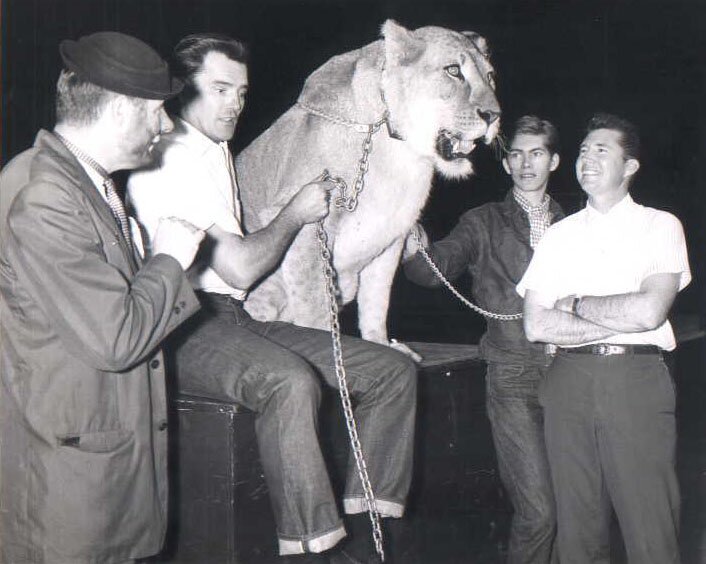
Lion on the loose!
"There were a lot of crazy things. Some guys came on with a full-grown lion, and people were supposed to be able to pet the lion. I looked at the owner and he had all these scars on him! It was almost time for the show, and just as went on the air the lion decided to jump up on my counter, which was on wheels. It rolled the table back and into the toy shop set and the whole set fell down. I said something like 'hold onto your hatswe've got a wild show today.'
Another time, some guy brought in rattlesnakes, and one of them got loose and started crawling across the floor. The camera guys jumped up on their pedestals, and I was terrified because one of the snakes was crawling towards some parents sitting off to the side. The guy got him.
Once, a fellow brought in a possum, and when I held him the crazy thing chewed on my arm and there was blood running down. A penguin once dropped his calling card on the top of the table while we were talking."
Rodrick discovered his future co-star amongst the WFLA cameras.
Barney Bungelupper joins the team
"Barney (Jerry Martin) was a floor director when I first met him, but there was something about his mood and attitude that gave me the idea he would be a great clown. I tried to pattern him after "Freddie the Freeloader" on Red Skelton, and the classic clown Emmett Kelley. I had that idea in mind and Jerry was incredible. He was a natural. It really was great. He was a big boost to the show.
We started filming the adventure stories, starring Uncle Bruce, Barney, and 'Little Mike,' and it was about that time that the ratings started to shoot up. I bought a 16mm camera, and Marj and I did all the filming.
I remember doing several adventure stories with cliffhanger endingstune in tomorrow to see how things work out. We did one about auto racing at Daytona Speedway, and an underwater adventure at Weeki Wachee. Barney starred in one we did at Cypress Gardens. We did one called "Showdown at Six Gun Territory," and Clu Gulager was in that one with us. When both of us were on camera, Marj would be the camera operator. In Daytona, we had her hanging out of the back end of a car, going down the trackit was incredible. Marj even learned to scuba dive at one time. She had a great time, and said many times that she never dreamed she'd have such an adventurous life."
Rodrick's son David also joined the act.
"David impersonated 'Little Mike' in one adventure. Mike was playing a detective in a raincoat, and we dressed up Andy so that Mike could 'walk.' You'd see Mike walking away from the camera, but it was really my son. Then we had to rush back and beg them to process our film along with the film shot that day by the news department."
In his heyday, "Uncle Bruce" was extremely popular and made many personal appearances.
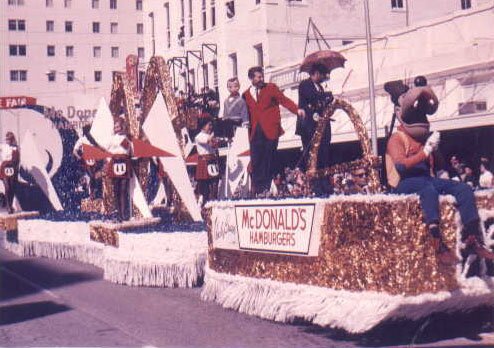
When McDonalds hamburgers were 12 cents!
"We were in all the parades, everywhere that Channel 8 could be seen. McDonalds was our sponsor, and we were always on their big, beautiful float. They were our best sponsor, and nice people."
In November of 1963, there was excitement in Tampa because of the impending visit of then President Kennedy.
"I remember we got some JFK masks and kidded around on the show about his being there. My director, Frank Stringer, did a very good impression of him. The only vivid thing I can remember is going to the station in the afternoon to prepare for the show, and someone came out to me on the curb and said 'The Presidents' been shot'. After thatit was kind of a blur. On Tuesday, when we were back on the air, I tried to talk to the kids about what happened. We were all so stunned, but I tried to give them a little perspective about what was going on."
Although Rodrick is not clear on exactly when the daily show ended, it was probably within a few months of Mary Ellen's departure in February of 1964.
"We were still on Sundays after the daily show went off, and Channel 8 said not to worry, we could stay as long as we wanted. I went to a Christian Convention over on the east coast of Florida, and there was a speaker on the program that really struck mehis presentation and the message that he gave. It was a powerful sermon calling us to be faithful in what God had called us to do. And I felt like I ought to go back to preachingthat was what I was supposed to do. Maybe it was the Lord speaking and he knew what the future held in television, because at the time I felt secure, but the way everything turned out later on I'm not sure it would have lasted. So, I think by God's grace I got out of there at the right time."
Rodrick accepted the pastor's job with a church outside Atlanta. Some local commercials brought his talent to the attention of a kid's show host on Channel 4, who invited Rodrick and "Little Mike" for some regular appearances.
"We just had a little segment and did stories and comedy routines. The host there was a fellow named Buddy Farnon, and he was very gifted. He also managed a large amusement park called "Funtown." His show was like a big, half-hour commercial for the amusement park. Just like Walt Disney and his "Disneyland" show. He had seen me do some commercial stuff, and asked me to join his show.
I went from Atlanta to serve a church in Minneapolis, Minnesota. I did commercials there for Cloverleaf Creamery, a dairy outfit, on Channel 4, the CBS affiliate. I used the same puppets all through the years in all my ministries.
Then, I got a job with a Christian publishing company in Cincinnati. They were the nations' largest producers of Vacation Bible School materials. I would travel all over the country promoting them and I also wrote scripts for the puppet plays. It was a wonderful experience for us."
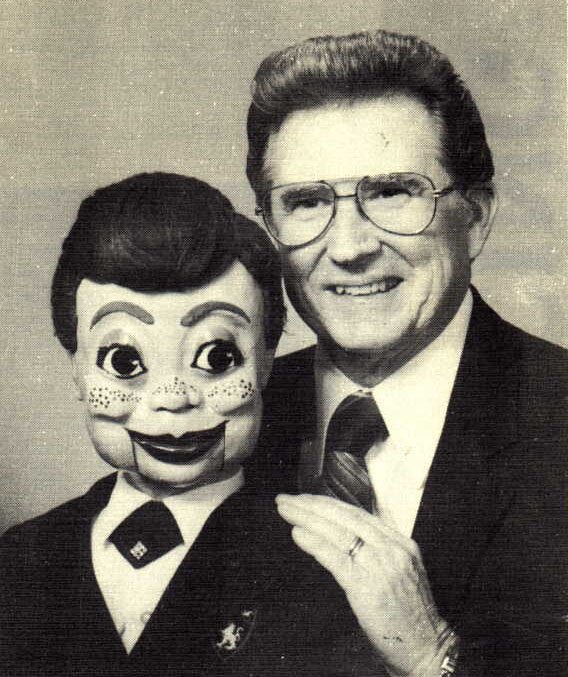
Little Mike gets a new 'do for 1980's
By the late 1980's, Rodrick and Marj returned to Minnesota and stayed for 14 years.
"I served in a church Albert Lea, Minnesota. I was going to retire there and then found out I couldn't afford to. My old church in Canby, where I first started, was looking for a minister, and I came back about four years ago."
Rodrick's wife Marj suffered a stroke in 2001. While her healing has been very promising, Rodrick decided to retire in order to assist Marj in her recovery. Now in his seventies, Rodrick is fortunately doing fine.
"I feel real good, and I still ride a motorcycle. I have an old World War II Harley Davidson, and use it in parades all the time."
I asked Pastor Rodrick to comment on the bygone days of local kid's shows
"There's nothing local anymore. I don't care for the content of much of today's programming, although in our era Daffy Duck and Bugs Bunny were just beating each other up. Channel 13 got static when they had 'The Three Stooges.'
What's missing today is the local hero, someone you could identify withwho was close by, and you could see in person. The kids can't come down to the studio and take part like they used to. That's sad. I cling to the old ways, and so I may not be fair in my judgment, but I miss all that. We had something to offer that's gone."
"Big 13" thanks the gentleman from WFLA-TV, 'Uncle Bruce" Rodrick, for sharing memories and observations from his long career in the ministry and television.
PULSE EXTRA
Here's a 2003 photo of 'Uncle Bruce' Rodrick and Lil Mike at the WTVT/WFLA reunion.
To return to "Captain Mac and Other Kids Show Hosts," CLICK HERE
To return to Main Menu, CLICK HERE